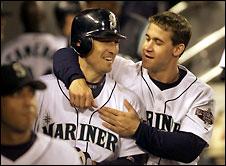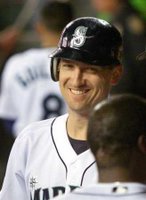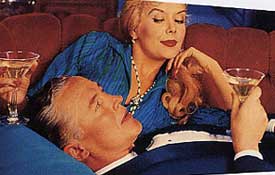Good night, sweet swing
John Olerud is retiring. Somehow I missed this news last week — probably because he made the announcement in his usual soft-spoken, undramatic fashion. I guess it's only fitting that he leave the game the same way he played it — quietly and without fanfare.
There goes the sweetest swing in the game of baseball.
A John Olerud at-bat was a thing of beauty. He stood easily at the plate, knees slightly bent, bat resting over his left shoulder (none of this rocking and waggling and stretching and perpetual adjustment). He was the very picture of patience and concentration — never swinging at junk, fouling off pitches at the edges, working the pitcher deep into the count, drawing a lot of walks. Between pitches, he would step back and gaze briefly into space, looking lost in thought.
 And what a swing. When he got his pitch, he let go with a long, smooth, fluid, fully-extended stroke that made a perfect arc down and up through the strike zone (it looked something like a combination of a golf swing and an Olympic hammer throw). He never slapped at the ball (he didn't have the speed to leg out an infield hit), nor did he try to muscle the ball out of the park. He was a precision line-drive hitter with incredible control, driving the ball deep into the gap or dropping it neatly into the shallow outfield. He hit for doubles and RBIs — an ideal clutch hitter.
And what a swing. When he got his pitch, he let go with a long, smooth, fluid, fully-extended stroke that made a perfect arc down and up through the strike zone (it looked something like a combination of a golf swing and an Olympic hammer throw). He never slapped at the ball (he didn't have the speed to leg out an infield hit), nor did he try to muscle the ball out of the park. He was a precision line-drive hitter with incredible control, driving the ball deep into the gap or dropping it neatly into the shallow outfield. He hit for doubles and RBIs — an ideal clutch hitter.At first base, his defense was sudden, smooth, and flawless. He put his glove on the ball as nimbly as his bat; his instinctive reactions to drives up the right side were uncanny. To his
 fellow infielders, he was an error-saving vacuum cleaner with a 10-foot reach... hurl the ball anywhere near Ole, and he'll complete the out.
fellow infielders, he was an error-saving vacuum cleaner with a 10-foot reach... hurl the ball anywhere near Ole, and he'll complete the out.On and off the field, he was a gentleman and a class act — quiet but not detached, reserved but not somber. He loved baseball and respected his teammates (who always got a kick out of kidding the serious guy). He had the concentration, dedication, and professionalism of Ted Williams, but he still enjoyed the game and kept its ups and downs in perspective.
He played for 16 seasons: 7 with the Blue Jays, 3 with the Mets, 4 ½ with the Mariners,
 half a season with the Yankees (he was in the on-deck circle when the last out of the dramatic 2004 ALCS was made); and one with the Red Sox (where he finished his career in style, despite being the one button-down guy in a dugout of assorted nuts). He was a two-time All-Star and a three-time Gold Glove winner, appearing in 8 postseasons and winning 2 World Series.
half a season with the Yankees (he was in the on-deck circle when the last out of the dramatic 2004 ALCS was made); and one with the Red Sox (where he finished his career in style, despite being the one button-down guy in a dugout of assorted nuts). He was a two-time All-Star and a three-time Gold Glove winner, appearing in 8 postseasons and winning 2 World Series.Few players ever have a season like Olerud had in 1993 in Toronto. With 200 hits, 114 walks, 24 home runs, and 107 RBIs, he led the American League that year in batting average (.363), times on base (321), on-base percentage (.473), doubles (54), and OPS (1.072); he tied Ted Williams's record for intentional walks (33); and he had a league-leading 26-game hitting streak in June. Most notable was the fact that he maintained a .400+ batting average well into August that year.
 Maus adored him. To me, Johnny O will always be the ideal of what a ballplayer should be — an increasingly rare combination of talent, fundamentals, consistency, competence, and humility. In this age of juiced sluggers and showboaters, baseball will miss the man at least as much as the player.
Maus adored him. To me, Johnny O will always be the ideal of what a ballplayer should be — an increasingly rare combination of talent, fundamentals, consistency, competence, and humility. In this age of juiced sluggers and showboaters, baseball will miss the man at least as much as the player.Helmets off to Ole.





3 Comments:
Well said. A lot of folks give the M's brass a bad rap for preferring "good character" in their free agent signings, but I think it counts for something. Especially if you can pick 'em like Keith Hernandez at first...
Thanks, and I totally agree. So, Carl Everett? A little injection of temper to knock these guys out of complacency?
Temper and, perhaps, entertainment value when he goes on a campaign to convince everyone on the bench that the moon landing was a hoax.
Post a Comment
<< Home